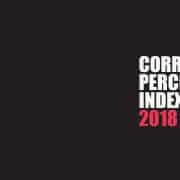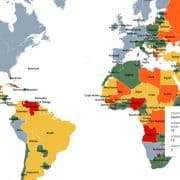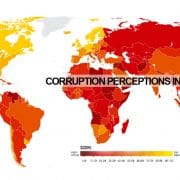|
Getting your Trinity Audio player ready...
|
Each year the release of Transparency International’s Corruption Perceptions Index generates a predictably polarised South African response.
Some insist that it understates our problem.
Others argue that it is part of a “cold war” waged by developed counties against developing countries, another platform for discrediting developing country governments by luming them with responsibility for a major global problem. This latter grouping is also wont to dismiss the report as a representation of “mere perception” rather than “reality”.
In the 2015 report, released this week, South Africa ranks 61st of the 168 countries surveyed. It scores 44 out of a possible 100, with 0 being very clean and 100 extremely corrupt. In 2012, we ranked 69th out of 176 countries and scored 43; in 2013, the comparative scores are 72 out of 177 and 42, and in 2014, 67 out of 175 and 44. So over the past four years the results suggest that levels of corruption are perceived to have stabilised.
We hover in a category of countries perceived to experience “serious” corruption; we are nowhere near the worst country in the world; and below us there is hell, where every transaction is corrupted, where there is no trust in government, and where the public has lost all vestige of hope of combating corruption.
Clearly, then, the Corruption Perceptions Index demands a more nuanced response than those represented by the characteristic South African polarities.
To the ostriches who want to believe that the perceptions reported do not represent “reality”: forget about it! These are the perceptions of people who have direct experience of the countries surveyed, whether as citizens who consume public services, public officials who are responsible for providing public goods and services, or business people who are investing and producing in the country. Their perception is not fabricated; it is rooted in lived reality.
Besides which, there is no other way to measure corruption. Unlike most crimes, in which there is a clear victim with an interest in reporting the criminal conduct, corruption is generally a conspiracy between two or more equally guilty par-ties whose victim is the public, which only rarely bears witness to the crime.
The upshot is that reported corruption or, worse, prosecuted corruption data, will inevitably massively understate the extent of the problem.
Do the survey results understate the extent of our problem? The respondents surveyed for the Corruption Perceptions Index are largely public and private sector leaders, journalists and academics, generally well-informed opinion leaders. Our interpretation of the cautious optimism expressed by their perception of stable corruption levels is that these are the sort of respondents whose line of sight encompasses important government leaders and institutions — the National Treasury and the auditor-general are probably the best examples — who understand the serious implications of unchecked corruption and who are taking concrete steps to curb it. This is the basis for their cautious optimism and it is valid.
On the other hand this does not represent the perceptions of ordinary South Africans. The Global Corruption Barometer, another important Transparency International survey, released a month ago, whose respondents are drawn from a representative sample of the population, found that 83% of the South Africans surveyed perceived corruption to be worsening. Our interpretation is that these perceptions are based on the brazenness of local politicians, officials and businesspeople, whose wealth and political connections allow them to flaunt their ill-gotten gains with impunity.
And, crucially, their conclusions are based on their everyday experience on the roads, in traffic licensing offices, and in the housing, hospital and Department of Home Affairs queues. Their perceptions are equally valid.
Should we care?
The Corruption Perceptions Index is closely consulted by international investors and risk analysts. It is clearly factored into their investment decisions. Those investors willing to play the corruption game — and there are plenty — will conclude that it’s not the price or quality of its bid for a big government project that will determine the outcome, but rather the political connections of their local partners or the palms that they grease. Those who refuse to tolerate corruption — and there are some — will not enter. And so we become host to the bad guys, and repel those who reject corruption, thus lowering the general ethical standard of the private sector.
Most important, the good work done by those in the government intent upon fighting corruption is overshadowed by the daily experience of ordinary South Africans and by major corruption-related episodes at the top.
I vouch that without Nkandla our ranking and score would have improved. And we should await with trepidation the outcome of the survey that will reflect the recent finance minister fiasco. Our ongoing conversations with a vast range of South Africans reveal that this incident is perceived not as an honest blunder but as an audacious gambit to capture the Treasury, principally to clear the decks for the corruption of the proposed nuclear power procurement deals.
The net effect is a continued erosion of trust in the government and the private sector, as well as in democratic institutions and in key Chapter 9 institutions like the Independent Electoral Commission. And so those who can vote with their wallets do so, as reflected in declining domestic and foreign investment. And those who have nothing to lose but their chains express their lack of trust in the government through service delivery protests and other forms of popular opposition.
If you doubt this then look at some of those below us, or even at about the same level as us, in the index. Malaysia ranked 50th. There, a major scandal implicating the prime minister has brought hundreds of thousands of citizens out on the streets.
China ranked 83rd. A series of devastating industrial accidents in which thousands died are directly attributed to corruption there.
Brazil’s ranking has dropped from 67 to 76 as a result of the searing Petrobras scandal, which has been accompanied by major social turmoil.
Guatemala ranked 123rd; a popular uprising in response to brazen corruption has driven the president out of office straight into prison.
So, yes, all of us should care.
What is to be done?
Our experience in Corruption Watch tells us that South Africa’s greatest asset in combating corruption resides in the refusal of ordinary South Africans to accept that corruption is an inevitable way of life.
This never-seen-a-problem-that-we-can’t-solve attitude is particularly evident among the young, further emboldened by their victory in the #FeesMustFall campaign.
Popular energy has to be directed at imposing consequences upon those who con-done or participate in corruption. The compromised police need to experience popular opprobrium at their participation in corruption, petty and grand. Perpetrators need to be named and shamed. Professional bodies governing the legal, auditing, engineering and other professions need to be pressurised to go for their members who facilitate and cover up corruption. Corrupt candidates for public office must be rejected. We need to take full advantage of public participation processes to ensure that our Chapter 9 institutions are led by people of integrity, intent upon protecting the democracy rather than the executive.
Corruption is a crime against the public. The public has to take the lead in combating it.
• First published in the Sunday Times
• This year’s African edition of the Global Corruption Barometer was produced in partnership with Afrobarometer








